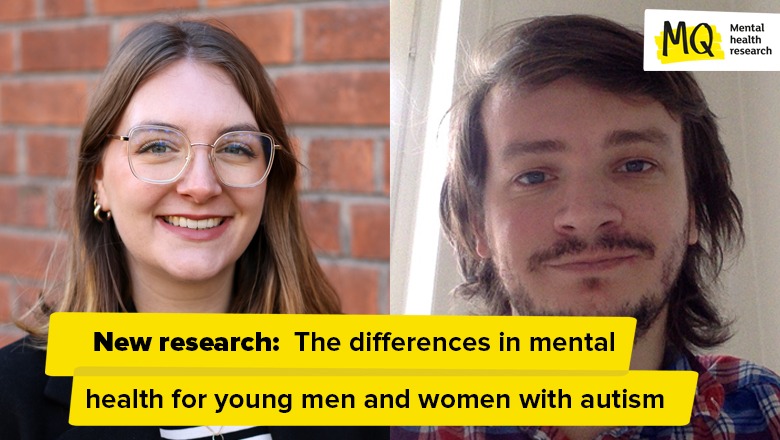This article was written by Miriam Martini, pictured above with MQ Fellow Mark Taylor.
Both Miriam and Mark are based at the Karolinska Instiutet in Sweden.
Autism is a condition that affects individuals’ social communication, as well as their interaction with the world around them. Autistic individuals have an increased risk for mental health problems. Around 70% of children meet diagnostic criteria for a mental health problem and among adults over 50% receive a psychiatric diagnosis.
Our study, supported by MQ, recently showed that these mental health difficulties are particularly pronounced amongst autistic women. We looked at these mental health problems during the transition to adulthood, between ages 16 and 25, when they commonly onset.
The study considered different levels of psychiatric care including diagnoses as well as hospitalizations for 11 psychiatric disorders including depression, anxiety, sleep, eating disorders and self-harm. Both autistic women and men were more likely to have received a psychiatric diagnosis and have been hospitalized due to a psychiatric disorder compared to non-autistic individuals of the same sex.
Compared to autistic men, for most disorders autistic women were more likely to receive a psychiatric diagnosis or be hospitalized for a psychiatric disorder in young adulthood.
By age 25, 62.4% of the autistic women compared to 45.3% of the autistic men had at least one psychiatric diagnosis, and 22.1% vs. 10.9% were hospitalized due to a psychiatric disorder. These numbers are very alarming and highlight the need to identify predisposing, precipitating, and perpetuating determinants of psychiatric difficulties in autistic individuals, particularly women.
Many factors could contribute to these higher rates of psychiatric diagnoses and hospitalizations in autistic women. Using specific behaviors and cognitive strategies to ‘hide’ or mask their autism characteristics, which may be more common among autistic women, can negatively impact mental health. Moreover, autistic women are often diagnosed later or misdiagnosed with co-occurring conditions before getting their autism diagnosis which might delay support access.
Many autistic individuals, particularly women also report negative experiences when searching for services for their co-occurring mental health problems. Receiving services is often described as difficult, with many facing barriers at different levels of the process. This includes availability of services, inadequate financing of services finding the environment at clinics difficult to cope with due to sensory difficulties, as well as the overall complexity of the healthcare system. Autistic individuals report feeling stigmatized when accessing services and consequently may be reluctant to seek help, which can further exacerbate their mental health conditions. Communication problems between autistic individuals and medical staff, who often report not feeling competent and confident in treating autistic individuals, might further complicate access to appropriate help.
To adequately support autistic individuals, and women in particular, co-occurring mental health conditions need to be more routinely considered and continuously managed.
Short-term suggestions to improve autistic individuals’ service experience include help in navigating the system – e.g. by making sure it is possible to book appointments in accessible ways – adapting communication, and addressing sensory stressors. Existing mental health services need to be provided by trained clinicians and adapted to the unique needs and strengths of autistic individuals. This requires clinicians to actively involve autistic individuals in treatment decisions and help them to manage their mental health conditions independently and autonomously.
Future research should identify factors contributing to mental health problems in autistic women and men and to which extent factors of intersectionality influence this association. It would further be of interest to identify the association and interaction between mental and physical health problems to gain a more holistic view of autistic individuals health.
You can read the paper published in JAMA Psychiatry here.
For more information about autism, including further research please visit Autistica's website.



